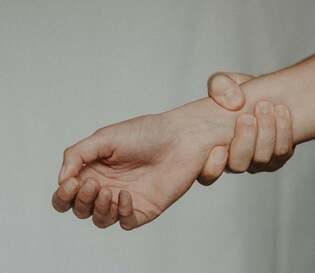|
What is Carpal Tunnel Syndrome? The carpal tunnel is a small space where the wrist meets the base of the hand. This space is covered by a thick ligament and creates a small tunnel where various nerves, arteries and tendons pass through from the forearm into the hand. If anything causes this space to be reduced, these structures can become compressed or damaged, particularly the median nerve. This condition is referred to as Carpal Tunnel Syndrome. What are the symptoms?
The hallmark symptoms of carpal tunnel syndrome are pain, tingling or numbness in the hand, usually following a typical pattern over the thumb, index and middle finger. There can also be a reduction in grip strength and wasting of the thumb muscles. Symptoms are usually worse on waking or with repetitive hand movements. Patients might also report difficulty holding items, writing or doing up their buttons. How does it happen? Carpal tunnel syndrome can be caused by anything that reduces the space in the carpal tunnel, including arthritis, the growth of a cyst or compression from everyday activities. The median nerve is particularly vulnerable to compression and is of the most concern as prolonged compression can cause nerve damage and permanent weakness of the hand. How is it treated? There are a few different treatment options for carpal tunnel syndrome. Non-surgical treatment is recommended first, which could include physiotherapy, wearing a splint, cortisone or plasma rich platelet injections to promote nerve healing. The effectiveness of physiotherapy will depend on the cause of your syndrome. If the space of the tunnel has been reduced permanently, such as with arthritis, then surgery is likely to be the most effective treatment. Carpal tunnel surgery is an operation to widen and release the carpal tunnel allowing decompression. This is a common procedure but is not without risks or complications and requires a period of time off work for recovery. For non-surgical cases, altered biomechanics of the arm, the mobility of the median nerve and muscle tightness may all be contributing to symptoms. In this case, physiotherapy can be highly effective, along with a period of rest, possibly splinting and a change in your daily activities.
1 Comment
John David
22/2/2022 06:15:51 pm
Hi friend,
Reply
Your comment will be posted after it is approved.
Leave a Reply. |
Categories
All
|


